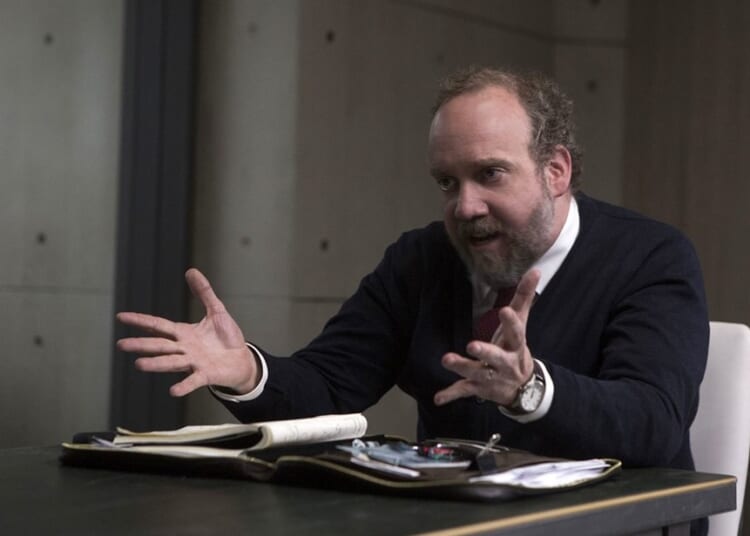The Christmas season doesn’t feel too bright for a handful of students at Barton, a prep school in New England, nor for the one instructor they all genuinely loathe. While most of their friends have gone home for the holidays, these students have to remain at school with Mr. Hunham, their instructor in ancient civilizations, whose idea for the holidays is to assign more study. In short order, the two-week break comes down to Mr. Hunham, the school’s grieving cook Mary Lamb, and Angus Tully, a rebellious and troubled teen who may have more in common with his nemesis than either know.
The film is set in December 1970, where the Vietnam War has claimed the son of the school’s cook Mary (Da’Vine Joy Randolph), about whom Mr. Hunham (Paul Giamatti) feels protective against the insensitivity of the students. Mr. Hunham seems to be grieving a wasted life, while Angus Tully (first-timer Dominic Sessa) grieves the destruction of his family. Over the period of two weeks, the threads of all these begin to unravel while the three find ways to come to terms with their lives and with each other. It’s better to avoid too much of the plot, other than its skeleton, to avoid any spoilers, but nothing ends as neatly or with as much resolution as we have come to expect from modern cinema — but that presents us with a much more realistic view of life, and far more believable character development.
The Holdovers came out seven weeks ago to much acclaim, and deservedly so. In every way, this recounts the American cinema of a more thoughtful, ambitious, and personal era: the late 1960s and 1970s. Director Alexander Payne deliberately chose this motif and utilizes it from the very start, with his throwback-esque logo for Focus Features and the manner in which much of the film’s credits run up front rather than at the end. Although The Holdovers was filmed in digital format, Payne added in granularity and film effects to give the film more of a throwback nature in the cinematography. (The Nice Guys had similar effects, although more to create a 1970s-era action-movie feel, which worked well indeed.)
Those are just effects, however, well-done though they may be. The real articulation of 1970s cinema comes in the story-telling, and in the avoidance of cheap resolutions in favor of nuanced and complex relationships between the characters. The Holdovers really does feel like a genuine holdover of this era, where realism and character development matter more than the final resolutions of the conflicts of the story. In some ways, this has the feel of 1969’s The Sterile Cuckoo, although with perhaps more comedy and somewhat more approachable characters.
The performances are superb, and not just by three main characters. Every character in the film seems much more grounded in reality, with their own quirks and surprises. Carrie Preston in particular provides some surprises as Mr. Hunham’s colleague Lydia, and Jim Kaplan as Ye-Joon Park has a powerful and emotional scene with Sessa that brings home the despair that runs through the film. Darby Lee-Stack also has a good performance in a too-mall role that provides a little light in the gloom. Mostly, though, this is a tour de force for the three lead actors, and it’s tough to set one performance over another among them. We have come to expect greatness from Giamatti, of course, so the performances of Sessa and Randolph feel more revelatory.
We often complain about a lack of creativity in Hollywood; The Holdovers gives hope that smaller and more meaningful films can still emerge outside of the art-house circuit, and can be done well.
The Holdovers has moved to online streaming platforms, but it’s well worth paying a subscription fee to see it. Expect this to get a lot of attention during awards season, and this is one film that richly deserves the accolades.
Using the Hot Air scale for films already on home theater platforms, The Holdovers gets a 4:
- 4 – Buy the film/subscribe to the service
- 3 – Worth a rental price or pay-per-view
- 2 – Wait for it to come on a TV channel you already get
- 1 – Avoid at all costs
The Holdovers is rated R by the MPAA (in a throwback title card at the beginning) for language and adult situations, as well as brief nudity. Older teenagers can handle this, and hopefully will relate to much of it, if the contemplative pace and dialogue can keep them interested.

